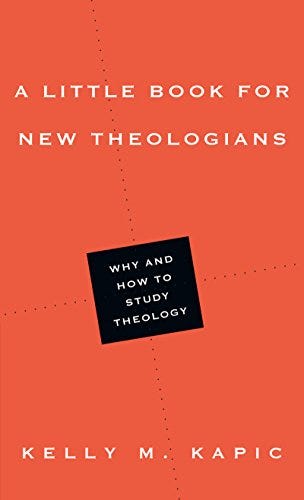how to be a theologian
according to one author, it has more to do with your heart than your mind
Beginning a course of study in Theology is a daunting task. Walking paths that have been trod by intellectual giants can be an intimidating undertaking, but Kelly M. Kapic’s A Little Book for New Theologians is a great introduction to the field.
The focus of this diminutive volume is not so much the practical how-to of studying theology, but rather the proper focus of the mind and heart as the student begins this course of study. Throughout the book, Kapic makes it clear that theology is an act of worship, and that our theological thoughts, beliefs, and understanding influence the rest of our lives as believers. “Growing in our knowledge of God,” he says, “changes our view of everything else. It is not that we lose sight of all except God, but rather that we view everything in light of God and through the story of his creation and redemption.”1
A glance at the Table of Contents makes it clear that this is a spiritually-focused introduction, rather than a practical how-to guide. Part One is entitled “Why Study Theology?”, a question answered with the dual focus of knowing God and developing as a believer. The second part of the book includes chapter titles like “The Inseparability of Life and Theology,” “Prayer and Study,” and “Love of Scripture.”
Kapic covers many valuable aspects of theological studies, but one that I have found especially valuable in both academic studies and practical ministry is the connection between intellectual study and understanding on one hand, and a rooted, experienced spirituality on the other. “One of the great dangers in theology,” he acknowledges, “is making our faith something we discuss rather than something that moves us.”2 If theological understanding is an act of worship, it must be focused always on that purpose.
Kapic also emphasizes humility as necessary to a proper study of theology, because it puts the student in a right position relative to both the Creator and fellow creatures.3 He uses Augustine as an example of this principle. Augustine, of course, holds a very high position in Christian thought and history; to many he is second only to the apostles and Christ himself. However, Augustine was sure to distinguish between his writings and Scripture and “described his theology as a work in progress.”4 He even wrote a volume late in his life called Retractions, in which he offered revisions and corrections to many of his earlier writings.5 This topic stood out as one that would be invaluable in ministry and study of all kinds. However great the depths of our knowledge and understanding may be in our own estimation, our knowledge, like our righteousness, is but filthy rags.
Another chapter especially relevant to the mission of this project focuses on the value of tradition and community. Kapic states that community must include seeking “the counsel of the saints from both the past and the present.”6 While Scripture is our foundational source of faith and doctrine, we cannot separate God’s Word from the insights provided by his church, not only today but for the last two millennia. It is too easy, he points out, to see Christ and the Scriptures through the lens of our culture exclusively.7
Kapic goes on to discuss the importance of orthodoxy and the early church’s use of creeds to remind believers of the fundamental truths of the faith. Many traditions still recite (or perhaps pray) these creeds weekly or even daily.8 I am convinced that learning these creeds would be highly beneficial to the members of our less traditional congregations. He goes on to highlight the need for unity in the church and points out the ways that different denominations can benefit, correct, and guide each other.9
This little book includes many other valuable principles and ideas for new theologians. The very last chapter, for instance, is entitled “Love of Scripture.” How often do theologians, biblical scholars, and even pastors lose that love that is so central to their vocation. Kapic’s slim volume is of immense importance as theologians, professional or otherwise, embark on their studies.
This book review is adapted from an assignment submitted for class in Practical Theology at Barnett College of Ministry and Theology, Southeastern University.
Next: why every Christian should study theology.
Kelly M. Kapic, A Little Book for New Theologians (Downer’s Grove, IL: InterVarsity Press, 2012), 26.
Kapic, 64.
Kapic, 71.
Kapic, 72.
Kapic, 73.
Kapic, 93.
Kapic, 95.
Kapic, 96.
Kapic, 97-98.






You posted! Great! Hope that seminary studies are going well.
Nice review. I've seen this little volume but haven't had a chance to read it. Sounds like it's worth the time. I've read Kapic's latest, "You're Only Human," and it was a very good book.
Another supplemental read to any Theology 101 class is Stanley Grenz's, Who Needs Theology? From your review, it seems these two books would dovetail nicely, covering some similar ground but each also covering some very insightful, helpful ground that the other does not. The categories of faith and the way people process faith in Grenz's book was very helpful to me my first year in seminary.